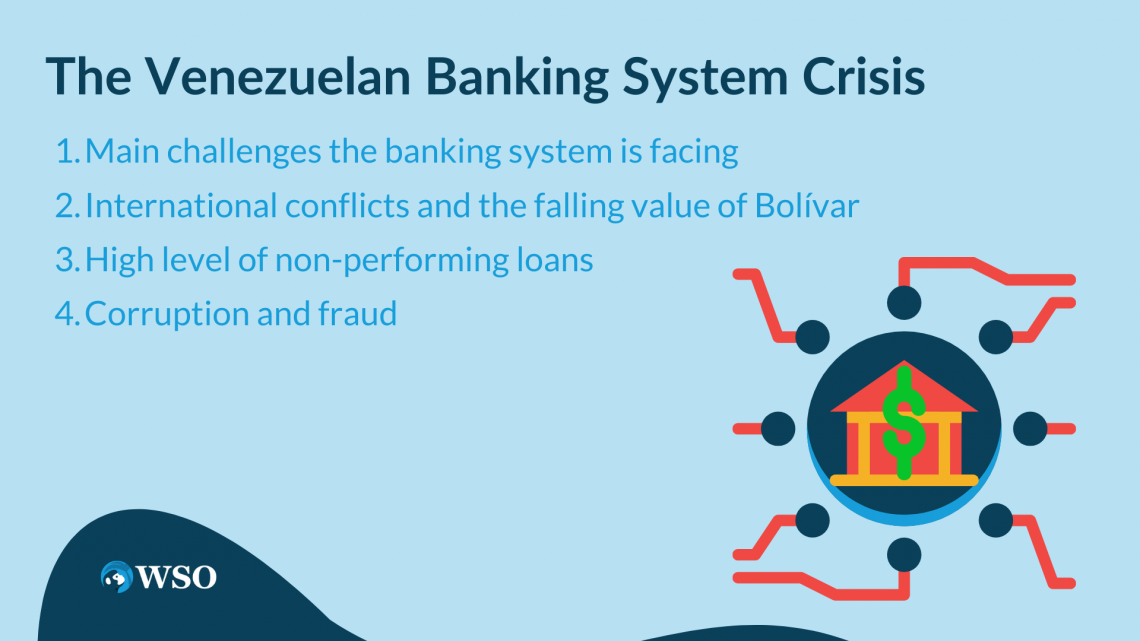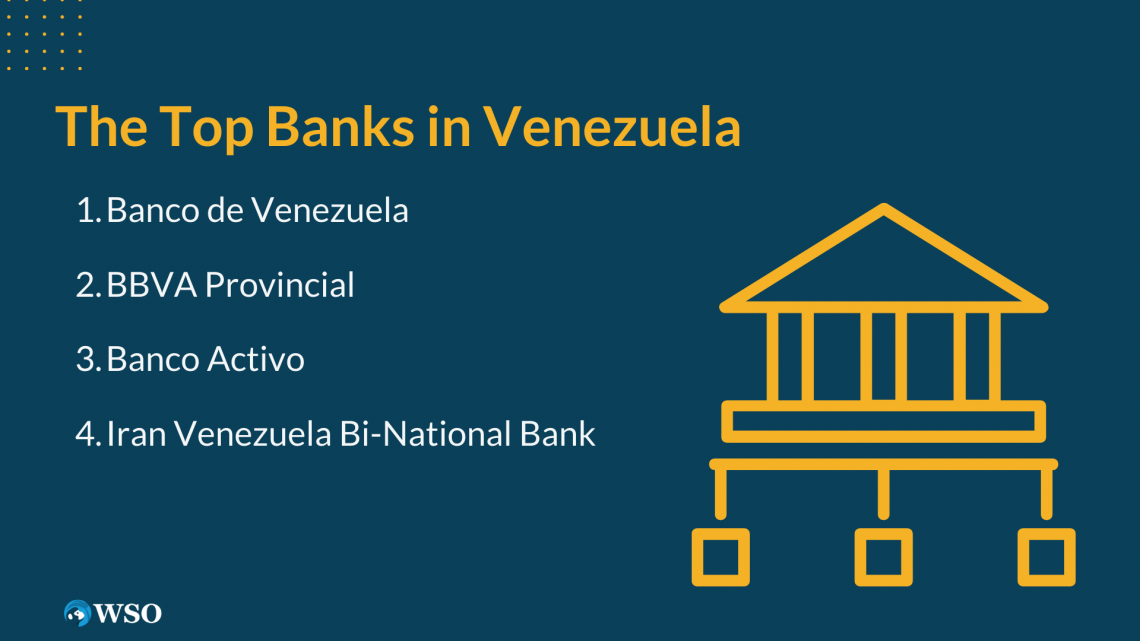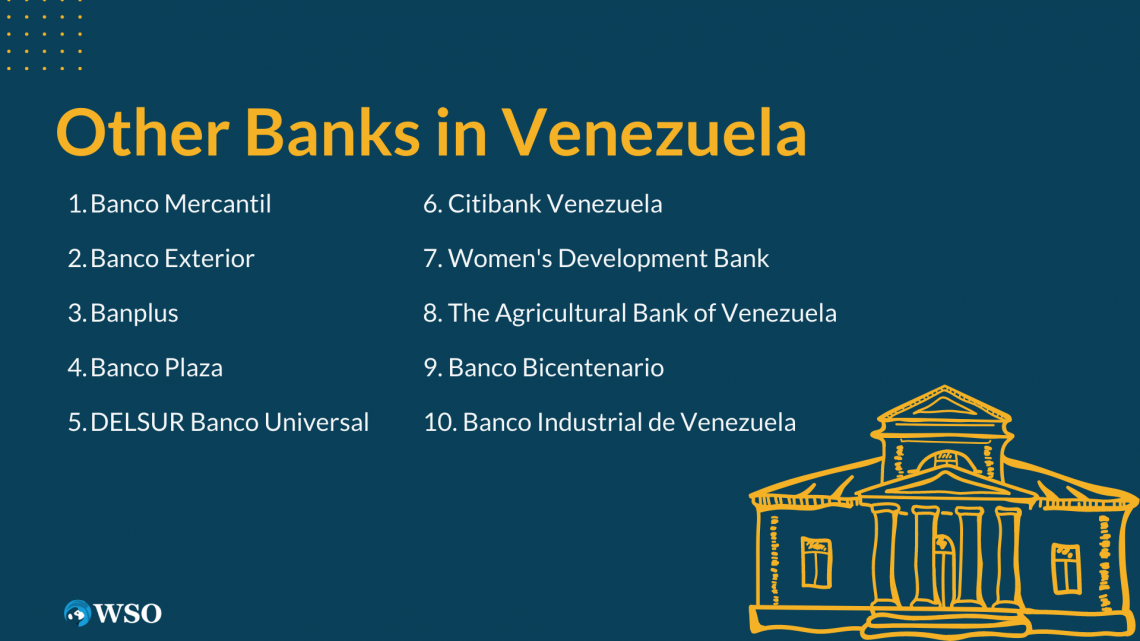Top Banks in Venezuela
Some of Venezuela's most prominent private banks are Banesco, Mercantil Banco, BBVA Provincial, Banco Occidental de Descuento, Banco Nacional de Crédito, and Fondo Común.
The origin of banking in Venezuela dates back to the colonial era when the Spanish crown established the Casa de la Moneda (House of Money - Mint House) in Caracas in 1802.

The first private bank in Venezuela was founded in 1890 by a group of Venezuelan businessmen with national public capital and is known as the Banco de Venezuela (Bank of Venezuela).
The banking sector in Venezuela expanded and diversified throughout the 20th century, especially after the discovery of vast oil reserves in the country in 1914.
The government created several public banks to finance various sectors, such as :
- The Banco Industrial de Venezuela (Industrial Bank of Venezuela) in 1937
- The Banco Agrícola y Pecuária (Agricultural and Livestock Bank) in 1940
- The Banco de Comercio Exterior (Foreign Trade Bank) in 1950.
The private banking sector also grew and diversified. Some of Venezuela's most prominent private banks were Banesco, Mercantil Banco, BBVA Provincial, Banco Occidental de Descuento, Banco Nacional de Crédito, and Fondo Común.
Key Takeaways
- The origin of banking in Venezuela dates back to the colonial era when the Spanish crown established the Casa de la Moneda in Caracas.
- The first private bank in Venezuela, Banco de Venezuela (Bank of Venezuela), was founded in 1890.
- The banking sector in Venezuela expanded and diversified throughout the 20th century, especially after the discovery of vast oil reserves in the country in 1914.
- The government created several public banks to finance various sectors, and the private banking sector also grew and diversified.
- The banking sector in Venezuela faced several challenges and transformations in the late 20th and early 21st centuries.
The Venezuelan banking system crisis
Venezuela's economic and political chaos has caused a deep crisis in the country’s banking system. The system, which includes the Central Bank of Venezuela and various public and private banks, has faced numerous challenges and transformations.

However, the system has suffered from corruption, mismanagement, sanctions, hyperinflation, and currency controls that have diminished its efficiency and stability.
Main challenges the banking system is facing
The banking sector in Venezuela faced several challenges and transformations in the late 20th and early 21st centuries. Venezuela had a major banking crisis in 1994-1995, which made half of the banks in the country declare bankruptcy.
The Venezuelan banking crisis was a period of economic recession in which the first bank to fail was Banco Latino, the country’s second-largest bank. After that, two banks (Banco Consolidado and Banco de Venezuela) also failed.
In 1999, Hugo Chávez, president of Venezuela, initiated a socialist political project known as the Bolivarian Revolution. Chávez implemented various economic and social policies that affected the banking sector in multiple ways.

On the one hand, Chávez increased public spending and social programs that boosted domestic demand and credit growth. Chávez imposed strict controls on foreign exchange, interest rates, inflation, and prices that reduced the profitability and competitiveness of banks.
Chávez also nationalized several private banks or acquired majority stakes in them, such as:
- Banco de Venezuela (2009), previously owned by the Spanish Santander Group.
- BANDES (2001), previously owned by a consortium of Venezuelan and foreign banks.
- Banco Federal (2010), previously owned by Venezuelan shareholders.
- Stanford Bank Venezuela (2009), previously owned by American businessman Allen Stanford.
Under President Nicolás Maduro, who assumed office after Chávez died in 2013, the banking sector continued to face difficulties.
Note
Maduro has maintained or deepened many of Chávez's policies that have contributed to a severe economic crisis characterized by hyperinflation, recession, shortages, debt default, sanctions, and social unrest.
International conflicts and the falling value of Bolívar
The central bank of Venezuela has also faced U.S. sanctions that prevent it from accessing international markets and assets.
Consequently, the bank has not been able to satisfy the demand for foreign currency, which has led Bolívar to lose 99% of its value since 2013.
High level of non-performing loans
Another problem is the high level of non-performing loans in the banking system. The high level of bad loans has reduced the profitability and solvency of the banks, and it has made them increase their provisions and capital requirements.
Corruption and fraud
The corruption and fraud have undermined the credibility and transparency of the banking system.
For example, Alejandro Ceballos Jiménez, a construction mogul who received public contracts for housing projects, secretly routed at least $116 million from public funds to offshore companies and family members' accounts. (According to secret bank reports obtained by BuzzFeed News and shared with ICIJ.)
Note
The Venezuelan banking system needs urgent reforms to restore its functionality and trustworthiness.
Some of the possible measures include:
- Lifting the currency controls and allowing a market-based exchange rate.
- Strengthening the supervision and regulation of the banks by an independent and autonomous Central Bank.
- Implementing anti-money laundering and anti-corruption policies and mechanisms to improve transparency and healthiness of the system.
- Promoting financial inclusion and innovation.
- Seeking international cooperation and assistance to rebuild the country's economy.
The Top Banks in Venezuela
Despite the challenges listed above, some banks have managed to survive or even thrive in the Venezuelan market by adapting to the changing conditions, diversifying their products and services, expanding their digital platforms, or catering to niche segments.

Nowadays, Venezuelan banks offer new services, such as P2P, C2P, digital wallets, and payment gateways, which can handle transactions from clients directly with national banks and franchises, establishing an alliance between banks and the new fintech firms. Some of them even took a step further and issued USD-based debit cards.
President Maduro always emphasizes transitioning to a completely digital economy so that merchants can use their debit cards for USD accounts. Below we have listed the top banks in Venezuela that outperformed in the country’s market based on their total assets, market share, and reputation:
Banco de Venezuela
Banco de Venezuela has a long history in Venezuela’s national financial system. Founded in the late nineteenth century, it was responsible for issuing coins until 1939, when the Central Bank of Venezuela was created.

After its nationalization by President Hugo Rafael Chávez Frías on July 3, 2009, Banco de Venezuela adopted a new strategic approach to promote financial inclusion.
Banco de Venezuela promoted banking, especially in historically excluded sectors, and supported the national productive sector through different programs to promote the economic and social development of the country. This action allowed it to regain leadership in credit.
As part of the guidelines issued by the National Executive for transforming the digital economy, the bank made important technological changes to become the bank of the future, mainly in its electronic channels, where it presents sustained growth in transactions.
Banco de Venezuela is the leader in operational points of sale in the country and number one in the national financial system.

Vision: To be the reference bank for all Venezuelans for its efficient, innovative, inclusive, and sustainable banking management model.
Mission: Guarantee all Venezuelans access to comprehensive financial solutions that meet their needs, and provide impetus and banking inclusion to the strategic development sectors of the Nation through an inclusive, efficient, dynamic, and responsive model.
Values:
- Responsibility
- Commitment
- Confidence
- Transparency
- Ethics
- Equality
- Inclusion
- Solidarity
- Challenges
Banco de Venezuela aims to continue developing a robust, accessible, and innovative system adjusted to the demands of futuristic banking linked to the commitment, ethics, and responsibility of human talent to consolidate the trust of customers and users.
It continues implementing efforts in banking to leverage the clients' and users' skills and abilities that allow them to relate to the financial system.

Banco de Venezuela also intends to further intensify the expansion of financial services through digital channels aimed at self-managing customer transactions to facilitate banking operations safely and comfortably from any device.
It maintains the momentum and training of Venezuelan entrepreneurs, providing them with financial tools through its flagship program EmprendeBDV, covering the productive sectors and expanding throughout the country.
It moves along with the national industry development policies implemented by the President, adapting them to the new technology required by the diversity of Small and Medium Enterprises (SMEs) as a fundamental part of the new emerging economy of the country.
BBVA Provincial
BBVA Provincial, a subsidiary of the multinational financial group BBVA, has undergone a transformation process in recent years.

This transformation allows BBVA Provincial to offer its customers access to the bank anytime, anywhere, and most conveniently, providing high-quality service and a broad and innovative digital platform that facilitates the management of different operations.
The bank continues with its policy of investing and venturing into key areas to generate profitable business, apply resource optimization strategies to maintain excellent efficiency rates, and work towards continuing to be the best bank in the country, offering customers innovative and safe products that make their lives easier.
With more than 60 years of operations in Venezuela at BBVA Provincial, it feels great pride to see so many achievements and dreams realized. The institution has always been hand in hand with Venezuela, favoring the country's development and its people.

Presence in the world: BBVA is a multinational financial group in more than 32 countries, with over 50 million customers and more than 110,000 employees.
BBVA is a leader in Spain, Portugal, Mexico, and Latin America and also maintains operations in the United States, Turkey, China, the United Kingdom, Portugal, Belgium, and France, among others.
Its presence is significant in South America, with offices in Argentina, Colombia, Chile, Peru, Paraguay, Brazil, Panama, Mexico, Uruguay, Puerto Rico, and Venezuela.
Banco Activo
Banco Activo, C.A. Banco Universal has developed a structure of Sales and Service Channels to strengthen the organization and guarantee optimal growth based on a functional design that allows the efficient execution of its processes and achieving its vision.

The product portfolio aims to collect and place basic products, checking accounts, savings accounts, certificates of deposit, loans, trust funds, and financial investments, redesigned through promotions, benefits, and/or interest rates to increase deposit volumes.
The bank's current operations primarily focus on key areas such as deposits, checks, custody of securities, transfers, and credits individually or cross-referentially, nationally or internationally.
Aligned with the stipulations and/or regulations in banking, finance, control, and administration of foreign currency, it is also focused on preventing and controlling money laundering.
By offering a diverse product portfolio and maintaining compliance with banking regulations, Banco Activo aims to provide comprehensive financial services to its customers while prioritizing security and risk management.
Iran Venezuela Bi-National Bank
Iran Venezuela Bi-National Bank is one of the international development and financial institutions and nongovernmental banks of the banking system in Venezuela.

It has been established to render banking services according to Iran's powerful Islamic banking system and handle modern international banking activities in other countries, according to the memorandum of cooperation between representatives of both countries.
Iran Venezuela Bi-National Bank has targeted South America as a strategic zone along with the foreign political programs of the Islamic Republic of Iran (I.R.I) beyond the boundaries of the Bolivarian Republic of Venezuela to provide opportunities for the investors, exporters, and businessmen of the country in this zone.
IVBB not only can expand the financial activities in international zones and develop the commercial relations among countries that hold stocks of IVBB but is beneficial in investment, entrepreneurship, and technical knowledge transfer between two investor countries.
IVBB seeks to contribute to economic development and collaboration between the two nations while expanding its financial activities internationally.
Other Banks in Venezuela
In case you are interested, below we have listed other Venezuelan banks:

- Banco Mercantil: It is the fourth largest bank in Venezuela, with a total Asset Under Management (AUM) of US$ 6.65 billion as of September 2020. It holds 6.65% of the total market deposits.
- Banco Exterior: A publicly traded bank with an international orientation.
- Banplus: Publicly traded bank with an entrepreneurial spirit. It caters to the financial needs of individuals and businesses.
- Banco Plaza: A publicly traded bank with an urban focus, providing banking services to customers in cities and urban centers.
- DELSUR Banco Universal: This is another publicly traded bank based in Ciudad Guayana with an industrial vocation.
- Citibank Venezuela: One of the few remaining foreign banks operating in Venezuela.
- Women's Development Bank: A bank dedicated to women's empowerment, focused on providing financial services and support to women entrepreneurs.
- The Agricultural Bank of Venezuela: It is a state-owned bank devoted to agricultural development. The bank supports the agricultural sector by providing financial services and resources.
- Banco Bicentenario: A state-owned bank created by merging several nationalized banks.
- Banco Industrial de Venezuela: A state-owned bank focused on industrial development.




or Want to Sign up with your social account?